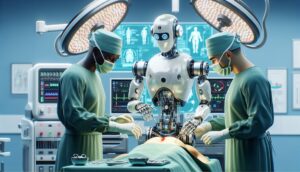The drug development process in the pharmaceutical industry is notoriously long and expensive; bringing a drug to market can often take more than a decade and cost billions of dollars. However, artificial intelligence (AI) is changing this dynamic and revolutionizing the process of drug development, evaluation, and approval. AI’s unparalleled ability to evaluate massive data sets, simulate molecular interactions, and predict therapeutic efficacy significantly shortens the time required for drug development.
It allows researchers to identify promising drug ideas in months instead of years, reducing R&D costs and increasing the success rate of clinical trials. Furthermore, AI helps researchers develop more precise drugs that target specific disease pathways while minimizing side effects. As global health challenges demand faster medical answers, AI is becoming a crucial tool in bridging the gap between cutting-edge research and available therapies for patients. This transformation ushers in a new era of data-driven innovation for the pharmaceutical industry.
Transforming Early-Stage Drug Development:
Early-stage drug development traditionally involved time-consuming and cumbersome procedures, such as searching for disease-related proteins, screening vast chemical libraries, and conducting extensive laboratory testing. Due to the high risk of failure, this phase alone can take years. Artificial intelligence (AI) is fundamentally changing this landscape by applying machine learning algorithms to sift through vast biomedical datasets and identify which chemicals have the greatest potential to become effective drugs.
Using AI-driven models, researchers can visually screen and evaluate millions of chemicals, focusing on the most promising, without having to physically test them all. For example, AI can identify novel therapeutic targets by analyzing genomic data, helping researchers develop compounds that interact with these targets. This precision increases the likelihood of developing safe and effective drugs and simultaneously accelerates the research process. By reducing the need for extensive trial and error, AI accelerates the transition from concept to drug candidate, allowing scientists to focus their resources on areas with the greatest potential for success.
Improving Preclinical Testing:
Preclinical testing, which assesses a drug’s safety and biological activity, is a crucial phase after the identification of a potential drug candidate. This phase is costly and time-consuming, and many drugs fail due to unexpected toxicity or ineffectiveness. AI addresses this problem by predicting a compound’s safety before it reaches the laboratory. Using deep learning models trained on historical toxicity data, AI can identify compounds with potential negative side effects. This allows researchers to eliminate risky drug candidates at an early stage.
Artificial intelligence (AI) can also simulate the interactions between drugs and various biological systems and accurately predict their absorption, distribution, metabolism, and excretion (ADME) properties. This eliminates the need for extensive animal testing, saving time and avoiding ethical dilemmas. By enabling rapid assessment of drug feasibility during the preclinical phase, resources are reduced, and promising drugs can be advanced more quickly to human trials, ultimately improving the efficiency of the entire R&D process.
Accelerating Clinical Trials:
Clinical trials, which require extensive human testing to ensure safety and efficacy, are typically the longest and most expensive phase of drug development. Artificial intelligence (AI) is revolutionizing this phase by streamlining data analysis, patient monitoring, and recruitment. Despite significant challenges in patient recruitment, AI can more efficiently match suitable patients with study participants by analyzing genomic profiles and electronic patient records. This precision strategy increases the likelihood of significant therapeutic benefits by recruiting the right patients.
AI-driven solutions can track patient data in real time during trials, identifying adverse events or changes in health status more quickly than with traditional technologies. This allows researchers to make more informed adjustments to dosages or research methods, improving safety and efficacy. AI can also analyze research data to identify biomarkers or subtle trends that would otherwise remain hidden, leading to a more profound understanding of a drug’s mechanism of action. AI accelerates clinical research and increases the likelihood of successful drugs reaching the market while shortening the R&D cycle.
Leveraging Precision Medicine for Drug Discovery:
Advances in precision medicine—the practice of tailoring medications to each patient based on their genetic makeup, lifestyle, and environment—are one of AI’s most impressive contributions to drug development. AI can integrate information from multiple sources, such as patient records, medical imaging, and the genome, to develop drugs better suited to specific subpopulations. By detecting genetic abnormalities that spread cancer across different populations, AI can help doctors develop treatment strategies that target cancer cells while sparing healthy tissue.
This personalized approach improves patient quality of life by reducing side effects and improving treatment outcomes. Furthermore, AI can predict how a patient will respond to specific medications, enabling physicians to select the most effective treatment options early on. As healthcare increasingly moves toward personalized medicine, AI-driven precision medicine is crucial for improving the effectiveness and accessibility of treatments worldwide.
Conclusion:
Artificial intelligence is revolutionizing the pharmaceutical industry’s drug development with unprecedented speed, accuracy, and cost-effectiveness. AI is revolutionizing the delivery of new medicines to patients, from early target discovery to accelerating clinical trials and improving preclinical testing. Higher success rates, more personalized treatments tailored to each patient’s needs, and more targeted drug design all benefit from the ability to collect vast amounts of biomedical data.
This technological revolution aims to improve patient outcomes, lower healthcare costs, and respond more effectively to global health emergencies, in addition to speeding up processes. As AI continues to develop, it will play an increasingly important role in drug research and become a vital weapon in the fight against disease. The future of medicine isn’t solely in the hands of scientists; it depends on the powerful collaboration between human knowledge and complex algorithms, which will enable the delivery of transformative medicines faster than ever.
FAQs:
1. How does AI support new drug development?
AI analyzes massive data sets to identify potential drug candidates, predict molecular interactions, and assess safety, eliminating the need for costly trial and error.
2. Can AI create new drugs from scratch?
AI can even accelerate the drug development process by using generative algorithms to generate new chemical structures that target specific targets.
3. Does AI reduce drug development costs?
AI significantly reduces R&D costs by shortening R&D cycles, reducing failures, and increasing clinical trial success rates.
4. Does AI play a role in personalized drug development?
There is no doubt that AI combines lifestyle, genetic, and medical data to tailor medications and therapies to each patient, improving efficacy and minimizing side effects.
5. Will AI replace human scientists in drug development?
No. Artificial intelligence (AI) is a technology that complements and augments human capabilities, allowing scientists to focus on creative research and strategic decision-making.




